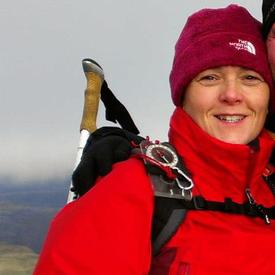Weights vs. Cardio for fat loss...
Replies
-
The bottom line is that cardio people are going to recommend cardio, and the lifters are going to recommend strength training. Ultimately it's up to you who to believe (pssst, only 1 of them is right), but I'd go with the people who support their arguments the best. Especially if they include references.0
-
did cardio, lost some weight, was tough to keep up, plateaued a lot, started lifting weights and the rest came off plus now I can eat more.
What do you mean plus you can eat more because you're doing weights?
muscle burns calories just sitting there, not being used. just to exist, it needs us to ingest more calories. so, those who have higher muscle mass, get to eat more food.0 -
Cardio for me, cycling, running and hiking....
Mainly because I HATE the gym!0 -
Why does everyone seem to think cardio is not also muscle building? My legs are solid muscle from running, any weight bearing excercise is also building your muscles, strengthening your bones, AND improving your heart. Yes, you need to do something for the top half also, but just wanted to state cardio and muscle building are not necessarily 2 different things.
I have to agree here, at least somewhat. I am no fitness expert, but I am a fairly I intelligent person. Here is what I have observed: My sons have been swimming competitively since they were about 5. They did not start strength training until they were teens, although they did some moderate body weight training all along. they both did hours of cardio as young kids. and both of them had chest, shoulder and ab muscles like you wouldn't believe. And this was before they were strength training. So their cardio workouts were definitely building muscle. Perhaps it was because they were young and growing. But they did build muscle doing primarily cardio.
Thanks everyone for so much insight into this without everyone getting mean about it! I plan to take your suggestions.0 -
Calorie deficit for fat loss.
Weights for muscle retention. (We lose muscle when when diet. This is sad.)
Cardio for cardio fitness, and to help maintain calorie deficit while eating more.
This.0 -
Why does everyone seem to think cardio is not also muscle building? My legs are solid muscle from running, any weight bearing excercise is also building your muscles, strengthening your bones, AND improving your heart. Yes, you need to do something for the top half also, but just wanted to state cardio and muscle building are not necessarily 2 different things.
Depends on what type of exercise / cardio you are doing.
Biking up hill in a big gear or running up hill with a weighted pack are going to spike your heart rate, and build muscle.
jogging at a moderate pace on flat ground is going to do some minimal "conditioning" (which may make you sore) but not build much muscle0 -
Weight loss diet for fat loss
Blood doping for cardio
Steroids for weight lifting.
This is how the pro's roll!!0 -
One peanut per day for every point of muscle you gain. Unfortunately, if you lose fat at the same rate you only get to eat half a peanut per day.did cardio, lost some weight, was tough to keep up, plateaued a lot, started lifting weights and the rest came off plus now I can eat more.
What do you mean plus you can eat more because you're doing weights?
muscle burns calories just sitting there, not being used. just to exist, it needs us to ingest more calories. so, those who have higher muscle mass, get to eat more food.0 -
I lost more WEIGHT (the number only) with longer, more often, cardio, but I went down more SIZES, and looked better, with shorter, but consistent, WEIGHT WORK (heavy weights).0
-
There are home workout DVD's that incorporate strength/weight training in the cardio workouts. I love Jillian Michaels, Bob Harper and the Biggest Loser workouts.0
-
Along those same lines, I'd posit that the training stress for weight-bearing cardio (i.e. running) actually decreases over time - as you lose weight, the load that the legs are forced to carry progressively decreases. I can definitely see muscular endurance increasing as distance is progressively increased - that's logical - but a decrease in load is counterproductive to continued hypertrophy. It would be akin to starting out squatting 200x5, "progressing" to 175x30 and wondering why your legs aren't getting bigger....But I don't see how you're going to maintain continuous adaptations necessary to continue hypertrophy if you're not progressively applying a hypertrophy inducing stress (steady-state cardio at low or medium intensity for example, I would expect minimal gains if any, and only initially).
For example, if you go to the gym and start lifting, you generally get bigger muscles as you adapt to the training stress. But if you do the same lifts and loading for a period of time, those adaptations stop at some point because you've adapted to the training stress.
With weight training, you can increase load to create new demands. I'm not aware of a convenient way to do this with cardio such that you're inducing hypertrophy (certainly you can, and probably should, increase training demands with cardio but are they hypertrophy related?). And if there is a way, can you do it continually?
I'm going to suspect that it's not practical to do so or at the very least, it's atypical of most methods of cardio....0 -
I do both, and it's not only working "well" for me, but it's working the BEST for me. Best wishes! :flowerforyou:0
-
Any personal trainer will tell you that if you want to look good naked, you need to do weight training.
Why looks better naked:
a boxer or sprinter (who both have large amounts of muscle), OR
a long distance runner (who has low muscle, but great endurance)0 -
Along those same lines, I'd posit that the training stress for weight-bearing cardio (i.e. running) actually decreases over time - as you lose weight, the load that the legs are forced to carry progressively decreases. I can definitely see muscular endurance increasing as distance is progressively increased - that's logical - but a decrease in load is counterproductive to continued hypertrophy. It would be akin to starting out squatting 200x5, "progressing" to 175x30 and wondering why your legs aren't getting bigger....But I don't see how you're going to maintain continuous adaptations necessary to continue hypertrophy if you're not progressively applying a hypertrophy inducing stress (steady-state cardio at low or medium intensity for example, I would expect minimal gains if any, and only initially).
For example, if you go to the gym and start lifting, you generally get bigger muscles as you adapt to the training stress. But if you do the same lifts and loading for a period of time, those adaptations stop at some point because you've adapted to the training stress.
With weight training, you can increase load to create new demands. I'm not aware of a convenient way to do this with cardio such that you're inducing hypertrophy (certainly you can, and probably should, increase training demands with cardio but are they hypertrophy related?). And if there is a way, can you do it continually?
I'm going to suspect that it's not practical to do so or at the very least, it's atypical of most methods of cardio....
Agreed.0 -
Bump for later
 0
0 -
I have to agree here, at least somewhat. I am no fitness expert, but I am a fairly I intelligent person. Here is what I have observed: My sons have been swimming competitively since they were about 5. They did not start strength training until they were teens, although they did some moderate body weight training all along. they both did hours of cardio as young kids. and both of them had chest, shoulder and ab muscles like you wouldn't believe. And this was before they were strength training. So their cardio workouts were definitely building muscle. Perhaps it was because they were young and growing. But they did build muscle doing primarily cardio.
Thanks everyone for so much insight into this without everyone getting mean about it! I plan to take your suggestions.
Two things:
1. "although they did some moderate body weight training all along." Thus, they did, in fact, do strength training.
2. "Perhaps it was because they were young and growing." Yes. As they grew, their overall body weight increased, meaning that the loading they had while performing their cardio increased.
So, yes, primarily cardio - in this case - was good for building muscle. But, once they stop growing - and if they stop strength training - they won't see any real muscle gain again. They'll keep what they have, but they won't gain.0 -
So if you eat less than 800 cal a day you will lose LBM without resistance training. That is not the same as what was being said earlier in this thread, that fat loss will always be accompanied by muscle loss. Personally, no matter what the study says I have a hard time believing anyone is going to add lean body mass on 800 cal a day which is what would be required to maintain RMR while losing fat.Why does everyone seem to think cardio is not also muscle building? My legs are solid muscle from running, any weight bearing excercise is also building your muscles, strengthening your bones, AND improving your heart. Yes, you need to do something for the top half also, but just wanted to state cardio and muscle building are not necessarily 2 different things.
Mostly because of the studies that show a loss of lean body mass with a caloric deficit and cardio only. If you are not in a calorie deficit, running or other forms of cardio may add some muscle. The initial growth will probably slow way down after a very short time.
Here is one of the many studies. The subjects were on a VLCD which is not ideal for FFM preservation but were obese, which makes FFM preservation at a VLCD less problematic. They were untrained individuals and so would have got some 'newbie gains' as well.
http://www.jacn.org/content/18/2/115.full
"In summary, the addition of high volume aggressive resistance training to a VLCD was associated with a significant weight loss while preserving LBW and RMR. The preservation of LBW and RMR during the consumption of a VLCD did not occur with a standard treatment control aerobic training program. These results indicate that high volume resistance training may be beneficial for patients who use a VLCD to lose large amounts of weight at least for periods up to 12 weeks. Future clinical studies need to determine its efficacy in long term weight loss programs and the maintenance of this weight loss for extended periods of time."
For example a person might lose 100 lbs of fat on a 800 cal a day diet. In order to maintain RMR that person would at the same time have to gain 40 lbs of muscle. Is that possible on a 800 cal a day diet? No.
I was posting it as an example - please see my comment explaining it - the fact that they are obese also is a factor that would lead to less loss of LBM. Also, where exactly did I say or insinuate that they gained LBM? The resistance trained folks maintained - the cardio group lost - that is the point0 -
Do both. You will burn fat and strengthen your muscles.
[/quote
Do this. ]0 -
Simple answer; both will burn calories. One preserves lean mass more effectively than the other. Take your pick.0
-
I done a bit of cycling an this happened to me
 (
(
http://www.huffingtonpost.co.uk/2012/07/30/london-2012-olympics-new-zealand-cyclist-robert-forstemann-shows-off-monster-thighs-picture_n_1719471.html0 -
But should I start weights in the beginning to gain muscle when I still need to lose the fat? I feel like I should start to lose first then add in weights. Idk though, I am kind of new to this and just wondering.
if you are eating in a deficit you are not going to gain muscle weight lifting -- you will build strength and burn body fat
If you eat enough protein and lift heavy, you can gain muscle even with a calorie deficit. My bicep measurement sometimes goes up when the rest of my measurements are going down and the weight is coming off.0 -
But should I start weights in the beginning to gain muscle when I still need to lose the fat? I feel like I should start to lose first then add in weights. Idk though, I am kind of new to this and just wondering.
if you are eating in a deficit you are not going to gain muscle weight lifting -- you will build strength and burn body fat
If you eat enough protein and lift heavy, you can gain muscle even with a calorie deficit. My bicep measurement sometimes goes up when the rest of my measurements are going down and the weight is coming off.
Generally that is due to glycogen/water retention. There are only a few situations when you can gain muscle on a deficit - 'newbie' gains which are only 1 - 2lb. When you add the fact that someone is significantly overweight to this - the amount can increase- the amount by which depends on age, sex, training intensity, size of the deficit etc0 -
The study said they maintained resting metabolic rate (RMR). In the presence of fat loss they would have had to gain LBM to maintain RMR. Note that they were not doing any heavy lifting either. They were doing light weights, high volume. The exact opposite of what is normally recommended on this forum.
So if you eat less than 800 cal a day you will lose LBM without resistance training. That is not the same as what was being said earlier in this thread, that fat loss will always be accompanied by muscle loss. Personally, no matter what the study says I have a hard time believing anyone is going to add lean body mass on 800 cal a day which is what would be required to maintain RMR while losing fat.Why does everyone seem to think cardio is not also muscle building? My legs are solid muscle from running, any weight bearing excercise is also building your muscles, strengthening your bones, AND improving your heart. Yes, you need to do something for the top half also, but just wanted to state cardio and muscle building are not necessarily 2 different things.
Mostly because of the studies that show a loss of lean body mass with a caloric deficit and cardio only. If you are not in a calorie deficit, running or other forms of cardio may add some muscle. The initial growth will probably slow way down after a very short time.
Here is one of the many studies. The subjects were on a VLCD which is not ideal for FFM preservation but were obese, which makes FFM preservation at a VLCD less problematic. They were untrained individuals and so would have got some 'newbie gains' as well.
http://www.jacn.org/content/18/2/115.full
"In summary, the addition of high volume aggressive resistance training to a VLCD was associated with a significant weight loss while preserving LBW and RMR. The preservation of LBW and RMR during the consumption of a VLCD did not occur with a standard treatment control aerobic training program. These results indicate that high volume resistance training may be beneficial for patients who use a VLCD to lose large amounts of weight at least for periods up to 12 weeks. Future clinical studies need to determine its efficacy in long term weight loss programs and the maintenance of this weight loss for extended periods of time."
For example a person might lose 100 lbs of fat on a 800 cal a day diet. In order to maintain RMR that person would at the same time have to gain 40 lbs of muscle. Is that possible on a 800 cal a day diet? No.
I was posting it as an example - please see my comment explaining it - the fact that they are obese also is a factor that would lead to less loss of LBM. Also, where exactly did I say or insinuate that they gained LBM? The resistance trained folks maintained - the cardio group lost - that is the point0 -
The study said they maintained resting metabolic rate (RMR). In the presence of fat loss they would have had to gain LBM to maintain RMR. Note that they were not doing any heavy lifting either. They were doing light weights, high volume. The exact opposite of what is normally recommended on this forum.
So if you eat less than 800 cal a day you will lose LBM without resistance training. That is not the same as what was being said earlier in this thread, that fat loss will always be accompanied by muscle loss. Personally, no matter what the study says I have a hard time believing anyone is going to add lean body mass on 800 cal a day which is what would be required to maintain RMR while losing fat.Why does everyone seem to think cardio is not also muscle building? My legs are solid muscle from running, any weight bearing excercise is also building your muscles, strengthening your bones, AND improving your heart. Yes, you need to do something for the top half also, but just wanted to state cardio and muscle building are not necessarily 2 different things.
Mostly because of the studies that show a loss of lean body mass with a caloric deficit and cardio only. If you are not in a calorie deficit, running or other forms of cardio may add some muscle. The initial growth will probably slow way down after a very short time.
Here is one of the many studies. The subjects were on a VLCD which is not ideal for FFM preservation but were obese, which makes FFM preservation at a VLCD less problematic. They were untrained individuals and so would have got some 'newbie gains' as well.
http://www.jacn.org/content/18/2/115.full
"In summary, the addition of high volume aggressive resistance training to a VLCD was associated with a significant weight loss while preserving LBW and RMR. The preservation of LBW and RMR during the consumption of a VLCD did not occur with a standard treatment control aerobic training program. These results indicate that high volume resistance training may be beneficial for patients who use a VLCD to lose large amounts of weight at least for periods up to 12 weeks. Future clinical studies need to determine its efficacy in long term weight loss programs and the maintenance of this weight loss for extended periods of time."
For example a person might lose 100 lbs of fat on a 800 cal a day diet. In order to maintain RMR that person would at the same time have to gain 40 lbs of muscle. Is that possible on a 800 cal a day diet? No.
I was posting it as an example - please see my comment explaining it - the fact that they are obese also is a factor that would lead to less loss of LBM. Also, where exactly did I say or insinuate that they gained LBM? The resistance trained folks maintained - the cardio group lost - that is the point
Check the study itself as well as the extract of the conclusion I posted - they maintained (actually a slight loss but within a reasonable error rate of saying they maintained) FFM. They were untrained - any lifting will be beneficial for LBM gains/maintenance. It has limitations which is why in general, heavy lifting is recommended. Also, remember 'heavy' lifting is generally more in the strength range as opposed to the hypertrophy range which is more mass focused.0 -
I'm a big fan of weight training. But, both is the key...along with eating right. I have had an issue with my stomach...always... I find that my stomach is going away alot faster now that I've added weights to my program and eating healthier. Was just doing Insanity for awhile, but need to get in better shape by May.0
-
The bottom line is that cardio people are going to recommend cardio, and the lifters are going to recommend strength training. Ultimately it's up to you who to believe (pssst, only 1 of them is right), but I'd go with the people who support their arguments the best. Especially if they include references.
Lol, I can guess which one by your profile picture. Thanks though, I think I'm going to do more strength training that I have been, I'll still do some cardio for my health, but won't let it take up most of my time. 0
0 -
I guess there are some people who don't know that your lean body mass doesn't stay the same at different weights. The LBM you have at 145 is not the same if you were at 200. I don't think people realize LBM includes everything in the body that isn't fat. It's not the same thing as muscle retention or strength retention.0
-
Good to see that I can look at this forum some random time for the first time in a couple weeks and still see one of these threads on page one0
-
Bump0
-
I have always been told that you should be doing both. I do weight lifting first then cardio.
My parents are personal trainers and former bodybuilders so my thinking is a little like theirs.0
This discussion has been closed.
Categories
- All Categories
- 1.4M Health, Wellness and Goals
- 398.5K Introduce Yourself
- 44.7K Getting Started
- 261K Health and Weight Loss
- 176.4K Food and Nutrition
- 47.7K Recipes
- 233K Fitness and Exercise
- 462 Sleep, Mindfulness and Overall Wellness
- 6.5K Goal: Maintaining Weight
- 8.7K Goal: Gaining Weight and Body Building
- 153.5K Motivation and Support
- 8.4K Challenges
- 1.4K Debate Club
- 96.5K Chit-Chat
- 2.6K Fun and Games
- 4.8K MyFitnessPal Information
- 18 News and Announcements
- 21 MyFitnessPal Academy
- 1.5K Feature Suggestions and Ideas
- 3.2K MyFitnessPal Tech Support Questions























